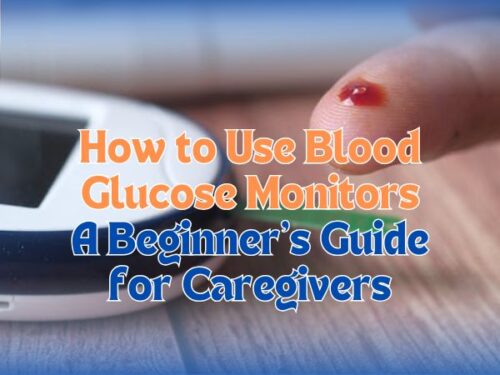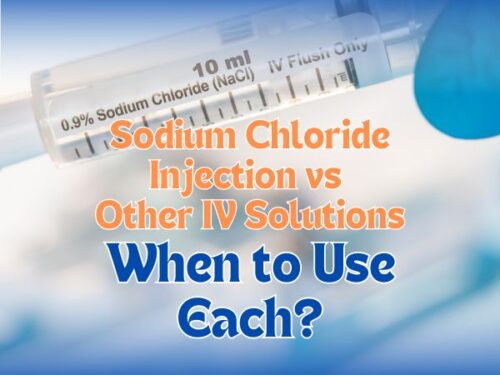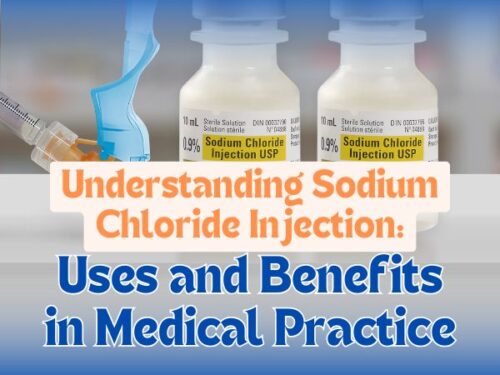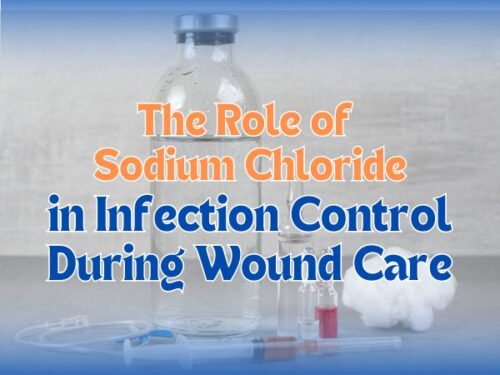Hematoma vs Bruise | Complete Details
The human skin, our largest organ, not only covers the body to protect internal structures but also signals if anything goes wrong inside. By noticing a change in the color or texture of the skin, many health issues can be identified. Similarly, the skin expresses bruises, hematomas, or other colored painful spots that appear due to various causes. But what is the difference between a hematoma vs bruise? How can you differentiate them? The main difference between a hematoma vs bruise is that a hematoma is a larger collection of blood trapped under the skin, causing noticeable swelling, while a bruise is a smaller injury affecting tiny blood vessels with minimal swelling. Hematomas typically need medical attention, while bruises usually heal on their own. Once identified, how should I give primary care? This article answers many of these frequently asked questions regarding hematoma vs bruise. So let’s dive in.
What is a hematoma?
A hematoma is the extravascular accumulation of blood under the skin due to the bursting of a blood vessel. This results in bulging or inflammation at the target site.
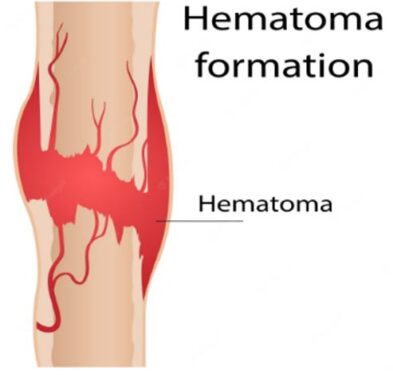
A hematoma formed due to the pooling of blood out of a blood vessel
Causes of a hematoma
The common causes of hematoma formation in the body include:
- Presence of aneurysms
- Bone-related injuries
- Use of certain medicines
- Presence of viral infections in the body such as chickenpox, mumps, rubella, HIV, or hepatitis C
- Recent phlebotomy i.e. puncturing of blood vessel with the aim to draw blood or administer a fluid or a drug
- Presence of a disease e.g. leukemia
Symptoms of hematoma
Now if you are thinking, ‘What does a hematoma look like?’ here is the answer. The following are the symptoms of a hematoma which help to identify them:
- Redness as well as tenderness of the skin
- Pain and inflammation
- The feeling of warmth at the affected site
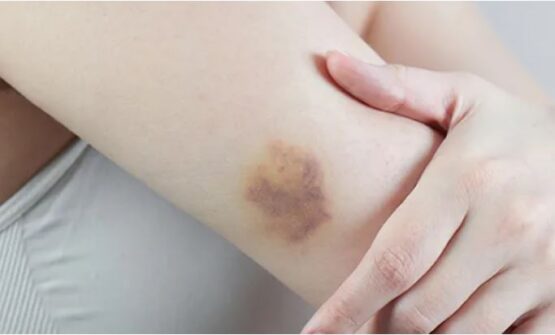
A patch of skin affected by a hematoma
How to diagnose a hematoma?
For the diagnosis of a hematoma, your physician might first look at your symptoms which can give away a soft tissue hematoma. However, if there is an indication of a severe hematoma, then any of the following tests can be recommended for confirmation:
- CT scan
- X-rays
- Ultrasound
- MRI

Hematoma within the skull detected by CT scan
How to treat a hematoma?
For the treatment of a hematoma, simple home remedies and some rest can indeed work like magic. These include putting ice cubes on the affected area and self-medicating with painkillers such as Tylenol or Advil. Painful hematoma can be managed by practicing the RICE method which includes:
- Rest and protect the affected site
- Ice or a cold pack which is to be put onto the hematoma
- Compression was applied to the affected area by wrapping the site
- Elevating or supporting the injured site
However, if the hematoma does not subside by doing these, it is best to consult your physician.
Are you at risk of hematoma formation?
Individuals with any of the following are more prone to hematoma formation than others:
- Progressing age
- Traumatic experiences in the recent past
- Use of blood thinning medications i.e. anticoagulants
What is a bruise?
A bruise, often termed a contusion, is a painful outgrowth on the skin which is formed as a result of the microscopic rupture of the blood vessels due to a recent trauma or an injury.

Skin affected by bruising
Causes of a bruise
The following may be the causes of bruising in the body:
- Bumps or accidents
- Tearing of the blood vessels adjacent to the skin
- Thinning of the skin due to old age
- Bleeding disorders
Symptoms of bruising
The appearance of the following may indicate the presence of a bruise:
- Purplish or bluish appearance of the skin at the affected area
- Pain and tenderness around the affected site
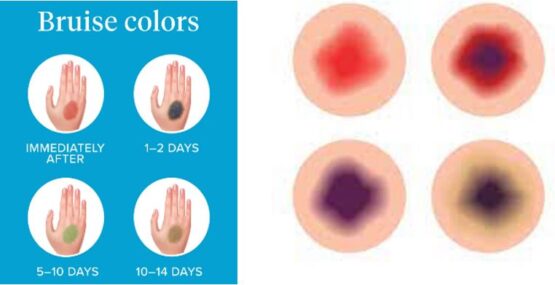
Changing the colors of a bruise over time
Diagnosis of a bruise
The diagnosis of a bruise is easy as compared to a hematoma because the individual can self-identify the changes in the skin texture and color. If it is severe, then it is advised to consult a physician who might want to go for an X-ray. However, if the bruising is frequent, it is better to run some tests to rule out the possibility of a bleeding disorder or, in another case, to confirm it.
How to treat a bruise?
A hematoma and a bruise, however different, can be treated by similar methods. The employment of the RICE method is also recommended in case of a bruise.
Are you at risk of bruising?
If you have any of the following health conditions, you may be at risk of experiencing bruising:
- Prolonged vitamin C deficiency
- Presence of bleeding disorders
- Use of anticoagulants
Hematoma vs bruise
| Parameters | Hematoma | Bruise |
| Definition | A collection of blood in the area of an injury | An injury to small blood vessels |
| Common causes | Bone fracture, rupturing of a blood vessel due to a needle, injury due to impact | Hitting an object |
| Symptoms | Pain, inflammation | The red bruise turning purple and then yellow |
| Diagnosis | Painful swollen areas can be diagnosed by CT scan, MRI, X-rays, etc. | Color change in the affected area |
| Risk factors | Old age, trauma, anticoagulant use | Vitamin C deficiency, bleeding disorders, anticoagulant use |
| Treatment | RICE method, surgery if the hematoma is in the brain | Often not required. Ice can help with the pain |
When Should You See a Doctor?
While most bruises and small hematomas can be treated at home with rest, ice, and elevation, some situations require professional medical attention. You should see a doctor if:
- The bruise or hematoma is unusually large or painful: Excessive swelling and pain may indicate a deeper injury that needs assessment.
- The affected area shows no signs of improvement after a week or two: Persistent discoloration or swelling may signal complications.
- There’s limited movement or numbness: This could suggest nerve involvement or damage in the underlying tissue.
- You experience frequent bruising or hematomas without a clear cause: This may be a sign of an underlying health condition, such as a bleeding disorder.
- The hematoma or bruise is accompanied by severe symptoms: If you experience fever, chills, dizziness, or if the hematoma continues to grow, these could be signs of infection or other complications.
In these cases, it’s best to consult a physician for a thorough examination and appropriate treatment.
FAQ about hematoma vs bruise
Q: How long does it take for a hematoma to heal?
A: Most hematomas heal within 1-4 weeks, depending on size and location.
Q: When should I be worried about a bruise?
A: Seek medical attention if the bruise:
– Appears for no known reason
– Is extremely painful
– Doesn’t fade after 2 weeks
– Is accompanied by severe swelling
Q: Can a bruise turn into a hematoma?
A: No, while both involve bleeding under the skin, they are different types of injuries from the start.
Conclusion
A hematoma, like a bruise, is a modification in the color and texture of a skin patch. Although both occur due to different reasons, it is possible to identify them and provide primary care at home. In most cases, this initial care is enough to get rid of a hematoma vs bruise but if not effective, it is advised to consult a physician for proper therapy.

PhD Scholar (Pharmaceutics), MPhil (Pharmaceutics), Pharm D, B. Sc.
Uzma Zafar is a dedicated and highly motivated pharmaceutical professional currently pursuing her PhD in Pharmaceutics at the Punjab University College of Pharmacy, University of the Punjab. With a comprehensive academic and research background, Uzma has consistently excelled in her studies, securing first division throughout her educational journey.
Uzma’s passion for the pharmaceutical field is evident from her active engagement during her Doctor of Pharmacy (Pharm.D) program, where she not only mastered industrial techniques and clinical case studies but also delved into marketing strategies and management skills.













